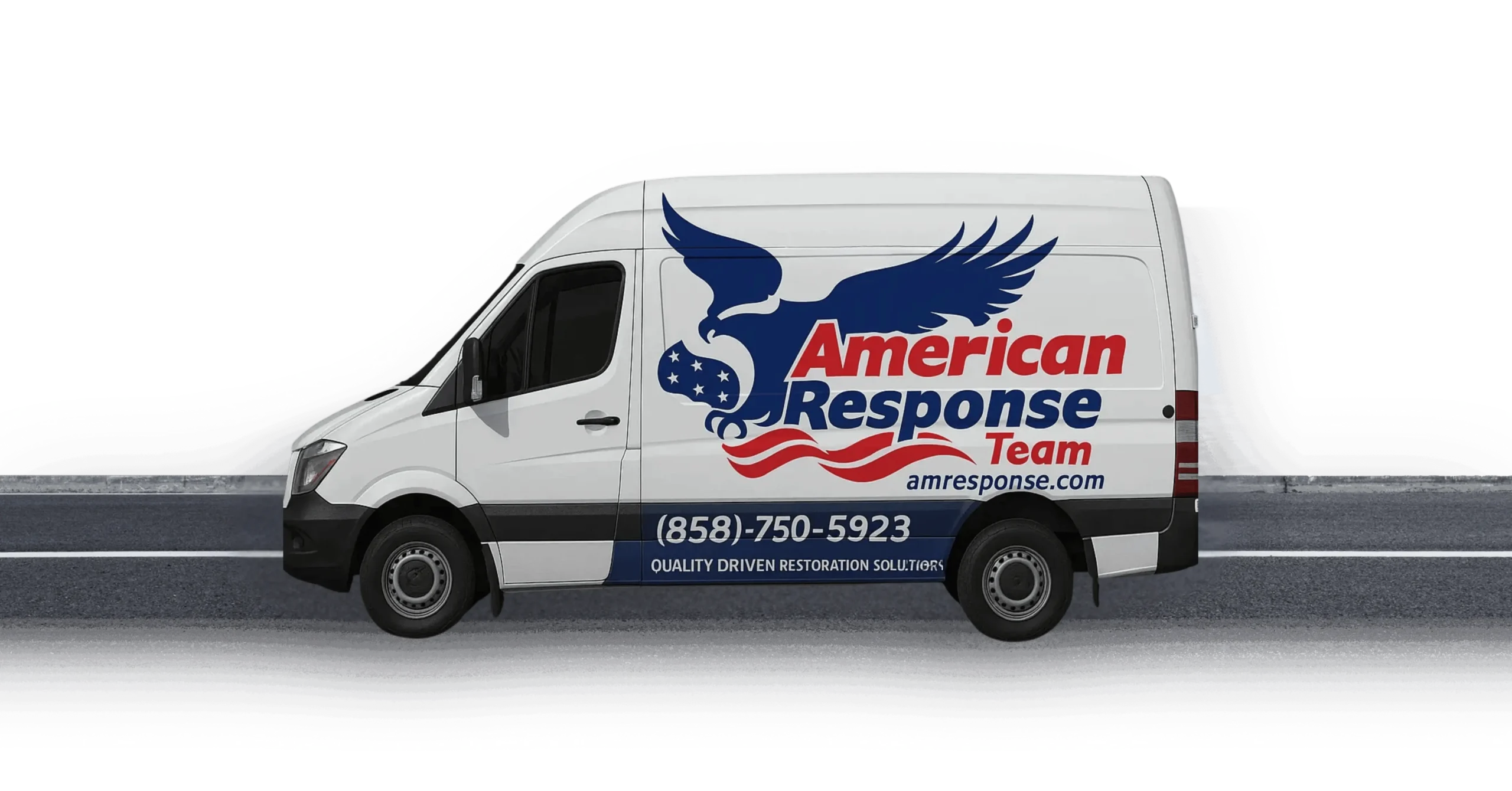When you discover mold in your home, you might wonder: Can alcohol kill mold? This is a common question that many San Diego homeowners ask when they see black spots on their bathroom tiles or smell that musty odor in their basement.
The short answer is yes – alcohol can kill some types of mold, but it’s not always the best solution. Understanding when alcohol works and when you need professional help can save you time, money, and protect your family’s health.
What Is Mold and Why Does It Grow?
Mold is a type of fungus that loves to grow in damp, warm places. It sends out tiny spores through the air that land on surfaces and start growing when they find moisture. In San Diego’s coastal climate, mold can be especially tricky because of our humidity levels.
Mold needs three things to survive:
- Moisture (from leaks, humidity, or floods)
- Food (wood, paper, fabric, or dust)
- Warmth (between 40-100 degrees)
When these conditions exist, mold can start growing within 24-48 hours. That’s why quick action is so important after any water damage incident.
Can Alcohol Kill Mold? The Science Behind It
So, can alcohol kill mold effectively? Rubbing alcohol (isopropyl alcohol) does have antifungal properties. When you apply alcohol to mold, it works by breaking down the mold’s cell walls and dehydrating the spores. This kills the surface mold that you can see.
However, alcohol has some important limitations:
What Alcohol CAN Do:
- Kill surface mold on hard, non-porous materials like glass and metal
- Work quickly because it evaporates fast
- Leave no toxic residue behind
- Cost less than commercial mold removers
What Alcohol CANNOT Do:
- Reach mold growing deep inside porous materials like drywall
- Kill all mold spores completely
- Prevent mold from coming back
- Work effectively on large areas of mold growth
The Best Way to Use Alcohol for Small Mold Problems
If you decide to try alcohol for a small mold spot (less than 10 square feet), here’s how to do it safely:
- Prepare the area: Open windows for air flow and wear gloves
- Mix the solution: Use 70% isopropyl alcohol mixed with equal parts water
- Clean first: Remove dirt and debris with soap and water
- Apply alcohol: Spray the mixture on the mold and let it sit for 10-15 minutes
- Scrub gently: Use a soft brush to remove the mold
- Dry completely: Make sure the area is totally dry when finished
Remember, alcohol is flammable, so keep it away from heat sources and flames.
When Alcohol Won’t Work: Signs You Need Professional Help
Can alcohol kill mold in every situation? Unfortunately, no. There are many times when alcohol simply isn’t enough:
Porous Surfaces
Materials like drywall, carpet, and unsealed wood have tiny spaces where mold can hide deep inside. Alcohol can’t reach these hidden areas, which means the mold will likely come back.
Large Areas
If mold covers more than 10 square feet (about the size of a 3×3 foot area), the EPA recommends calling professionals. Large mold problems usually mean there’s a bigger moisture issue that needs expert attention.
Health Concerns
People with allergies, asthma, or weak immune systems should avoid DIY mold removal. Professional mold remediation keeps everyone safer.
Hidden Mold
If you smell mold but can’t see it, there might be growth behind walls or under floors. This requires special equipment to find and remove safely.
Why Professional Mold Removal Is Often Better
While alcohol might seem like an easy fix, professional mold experts have tools and knowledge that homeowners don’t. Here’s what professionals do differently:
Advanced Detection
Professionals use moisture meters and thermal imaging to find hidden mold that you can’t see. They also test the air to measure spore levels.
Proper Equipment
Industrial HEPA air scrubbers, dehumidifiers, and antimicrobial treatments are more effective than household alcohol. These tools can handle larger areas and deeper penetration.
Complete Removal
Instead of just cleaning surface mold, professionals often remove contaminated materials entirely. This stops the mold from growing back.
Source Control
The most important part of mold removal is fixing the moisture problem that caused it. Professional teams find and fix leaks, improve ventilation, and control humidity.
Alternatives to Alcohol for Mold Removal
If you’re wondering “can alcohol kill mold better than other options,” here are some alternatives:
White Vinegar
Vinegar is more acidic than alcohol, which makes it better at killing certain types of mold. It can also penetrate porous surfaces slightly better than alcohol.
Hydrogen Peroxide
This works on both porous and non-porous surfaces and is safer than bleach. However, it can bleach colored materials.
Commercial Mold Removers
These products are specifically designed for mold and often work better than household items. Always follow the label instructions carefully.
Bleach (Limited Use)
While bleach can kill surface mold on hard surfaces, the EPA doesn’t recommend it for routine mold cleanup. It’s harsh, toxic, and doesn’t penetrate porous materials.
Preventing Mold Growth: Better Than Any Cleaner
The best answer to “can alcohol kill mold” is that prevention works better than any cleaner. Here’s how to keep mold from growing in the first place:
Control Moisture
- Fix leaks immediately
- Use exhaust fans in bathrooms and kitchens
- Keep humidity below 60%
- Ensure proper drainage around your home
Improve Air Flow
- Open windows when weather allows
- Don’t block air vents
- Consider a dehumidifier in damp areas
Regular Maintenance
- Clean gutters regularly
- Inspect for leaks monthly
- Address water damage quickly
When to Call American Response Team
Sometimes the question isn’t “can alcohol kill mold” but rather “should I handle this myself?” Here are clear signs it’s time to call professionals:
- Mold covers more than 10 square feet
- You smell mold but can’t find the source
- Mold keeps coming back after cleaning
- Anyone in your home has health issues
- The mold appeared after flooding or major water damage
American Response Team specializes in mold inspection and removal throughout San Diego County. Our certified technicians use EPA-approved methods to safely remove mold and prevent it from returning.
We work directly with insurance companies and provide free estimates for damage evaluation. Our team is available 24/7 for emergency response, because mold problems can’t wait.
The Bottom Line: Can Alcohol Kill Mold?
Yes, alcohol can kill mold on small areas of hard, non-porous surfaces. However, it’s not a complete solution for most mold problems. Here’s what to remember:
- Use 70% isopropyl alcohol for best results
- Only try DIY methods on areas smaller than 10 square feet
- Always fix the moisture source first
- Wear protective gear and ensure good ventilation
- Call professionals for larger areas or porous materials
If you’re dealing with mold in your San Diego home, don’t take chances with your family’s health. Whether you need a mold inspection or complete remediation, American Response Team has the experience and equipment to handle any size job safely and effectively.
Understanding the answer to “can alcohol kill mold” is just the first step. The most important thing is taking action quickly to protect your home and family. When in doubt, it’s always better to consult with professionals who can assess your specific situation and recommend the best course of action.
Ready to solve your mold problem safely? Contact American Response Team at (858) 750-5923 for a free consultation. Our certified mold specialists serve all of San Diego County with fast, professional service you can trust.
Additional Resources
For more information about mold safety and removal, visit these authoritative sources:
- EPA Mold Cleanup Guidelines – Official EPA guidance on mold removal
- EPA Basic Mold Cleanup Steps – Step-by-step cleanup instructions
- EPA Mold Prevention Guide – Comprehensive mold and moisture guide
Remember, while alcohol might help with small surface mold, professional remediation ensures complete removal and prevents future growth. Don’t let a small mold problem become a big health hazard.
Learn more about our mold prevention strategies and discover why quick action after water damage is so important for San Diego homeowners.

